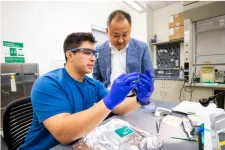(Press-News.org) Cells contain molecular machinery that targets and disposes of unwanted proteins to maintain homeostasis. Scientists think that with the help of “matchmaker” molecules called molecular glue degraders, this machinery could be hijacked to control proteins involved in diseases like cancer. But only a few of these glue degraders have been discovered so far—and mostly by chance.
Zuzanna Kozicka, as a Ph.D. student at Friedrich Miescher Institute in Basel, Switzerland, embarked on a deliberate search for these glues with her team and identified a novel class of molecular glue degraders with more than 40 chemically diverse members. Kozicka, who is now a postdoctoral fellow at the Dana Farber Cancer Institute, also took a closer look at the crystal structures of the complexes that these molecules induce to glean clues about how they carry out their matchmaking services. She is the grand prize winner in molecular medicine of the 2023 Science & SciLifeLab Prize for Young Scientists for these discoveries.
One of the ways cells dispose of unwanted proteins is through the action of enzymes called E3 ligases—what Kozicka refers to in her winning essay as “garbage patrols”—that mark “cellular offenders” for destruction. Researchers want to co-opt this process to target specific disease-causing proteins, and molecular glue degraders could be one of the best ways to bring together E3 ligases with these proteins.
There are more traditional methods for inactivating disease-causing proteins, by blocking or altering their active sites where their natural molecular partners or ligands bind, for example. But not all proteins have enzymatic functions one could block and many work as scaffolds, which makes them very hard to modulate with conventional inhibitors. “This is why hijacking the degradation machinery to degrade an offender of interest is such an exciting strategy,” Kozicka writes. “It circumvents these limitations and makes the entire target protein disappear from the cell.”
Transcription factor proteins, for instance, are high priority drug targets in many cancers, she said. “However, most transcription factors are considered undruggable by conventional small molecules due to their structural disorder and lack of discrete ligand-binding cavities.”
Glues could bridge the gap between these undruggable proteins and the cell’s garbage patrols, but until now few glue degraders have been discovered. The drug thalidomide, for instance, became infamous in the late 1950s for causing deadly birth defects and fetal limb deformities. But analogs of the drug have found new life as a treatment for multiple myeloma working via the molecular glue degrader mechanism.
To find more glue degraders, Kozicka and her colleagues analyzed databases of drug toxicity and correlated those with levels of E3 ligase activity in hundreds of cancer cell lines. They were looking for small molecules whose toxicity depended on the ligases, which would suggest they are hijacking the cellular garbage disposal process for their activity.
Their research first identified CR8, a glue degrader of cyclin K, which is a potential drug target in several cancers. Through further studies, Kozicka’s team has identified more than 40 different molecular glue degraders. The researchers have also mapped out the structures of complexes induced by many of these molecules, which helps them determine exactly how they interact with ligases and offenders to bring them together, offering hints on how glues could be rationally tweaked and designed.
“At this stage with every serendipitous discovery or molecules picked out of a systematic search like ours we are learning a lot of new things, helping us to understand the principles of molecular glue action,” said Kozicka.
“The challenge now is to take this further to make such glues prospectively designable—say, ‘oh, I want to degrade the oncogenic transcription factor Myc’ and be able to come up with libraries of chemical matter that could do that,” she added. “While we’re not there just yet, researchers in the field are moving full steam ahead to make this a reality.”
Kozicka is also curious to learn whether there are molecular glue degraders that naturally occur in our cells. “We know this is the case in plants but we have yet to discover if, for example, there are perhaps certain metabolites which induce protein-protein interactions that lead to protein degradation via this mechanism in humans,” she said.
“Receiving the SciLifeLab Prize is a great honor, and I believe it will provide me with the confidence and support to pursue more ambitious scientific questions,” Kozicka said. “I also hope that this recognition can help introduce the concept of compound-induced interactions to a wider audience, raising awareness about the potential impact of proximity-inducing small molecules.”
The Science & SciLifeLab Prize for Young Scientists acknowledges that global economic health is dependent upon a vibrant research community that needs to incentivize the best and brightest to continue in their chosen fields of research, as they begin their scientific careers.
“Every year, the Science & SciLifeLab Prize for Young Scientists brings to light groundbreaking science and exceptional young scientists who push the boundaries of our understanding. For example, Zuzanna Kozicka's work on molecular glue degraders is reflecting innovative scientific discovery. Her systematic identification of over 40 molecular glue degraders opens a path to target disease-causing proteins. It is great for us at SciLifeLab to recognize her achievements and I believe this research will contribute significantly to the future of molecular medicine. I want to express congratulations to all the winners for their exceptional contributions and welcome them to the celebration in Stockholm in December”, said Professor Olli Kallioniemi, SciLifeLab Director.
2023 Winners
Rachel Kratofil is a winner in the prize’s cell and molecular biology category for her essay “Working up an appetite to promote repair.” Kratofil received an undergraduate degree from the University of Victoria and a Ph.D. in immunology from the University of Calgary. She is a postdoctoral fellow at New York University Grossman School of Medicine. Her research aims to uncover how barrier tissues adapt to microbial cues in the context of injury.
Yodai Takei is a winner in the prize’s genomics, proteomics and systems biology category for his essay “Imaging nuclear architecture in single cells.” Takei received undergraduate and master’s degrees from The University of Tokyo and a Ph.D. from the California Institute of Technology, where he is a postdoctoral scholar in the division of biology and biological engineering. His research focuses on understanding spatiotemporal regulation of chromatin organization and gene expression.
Jessica Kendall-Bar is a winner in the prize’s ecology and environment category for her essay “Lessons from sleep in the deep.” Kendall-Bar received undergraduate degrees from the University of California, Berkeley, and a Ph.D. in ecology and environmental biology from the University of California, Santa Cruz. She is a Schmidt AI in Science Postdoctoral Fellow at Scripps Institution of Oceanography at the University of California, San Diego. Her research investigates the resilience and precarity of ocean ecosystems through neurophysiology, signal processing and advanced data visualization.
END
New molecular glue degraders could help target troublesome proteins
Summary author: Becky Ham
2023-11-16
ELSE PRESS RELEASES FROM THIS DATE:
High efficiency and cooling performance in an electrocaloric heat pump
2023-11-16
Researchers have developed a solid-state electrocaloric cooling device that can generate a 20 kelvin temperature difference with high efficiency, according to a new study. The findings show that electrocaloric cooling can compete with other solid-state cooling strategies and offer a promising alternative to environmentally unfriendly vapor compression cooling. Cooling devices, including air-conditioning and heat pump systems, are estimated to consume roughly 20% of global electricity. Most of these systems operate through vapor-compression technologies, which are relatively inefficient and require environmentally harmful fluorinated refrigerants. Cooling through solid-state electrocaloric ...
The secret behind mussels’ quick-release interface
2023-11-16
The same bundle of non-living filaments that mussels use to anchor themselves within their environment – to withstand crushing waves, for example – can also be jettisoned on demand. Mussels create this quick-release interface, a new study finds, by way of a neurochemically-mediated junction, where billions of motile cilia hold fast to interlinked biopolymer sheets. "[The study’s] findings could be informative about how nonliving materials can be dynamically interfaced with living tissue, as in the case of detachable biosensors and medical implants," write Guoqing Pan and Bin Li in a related ...
Presenting a new GRAB sensor toolkit for neuropeptides
2023-11-16
New biosensors have helped reveal the activity of neuropeptides in the brain, researchers report, providing novel tools for studying the release, function, and regulation of these crucial signaling molecules in vivo. According to the study, the approach has the potential to address key questions regarding neuropeptides and their roles in health and disease. In the brain, neuropeptides are key signaling molecules in the body that regulate many critical physiological functions, including digestion, metabolism, sleep, and higher ...
UCSC doctoral graduate wins prestigious Science & SciLifeLab Prize for Young Scientists
2023-11-16
Jessica Kendall-Bar, who received her Ph.D. in ecology and evolutionary biology last year from UC Santa Cruz with co-advisors Terrie Williams and Dan Costa, was named a recipient of the prestigious Science & SciLifeLab Prize for Young Scientists for her research on elephant seal sleep habits while they are at sea.
The Science & SciLifeLab Prize is an international prize awarded by the American Association for the Advancement of Science (AAAS) and the journal Science to early career scientists for their outstanding thesis research in the life sciences. As ...
How cell identity is preserved when cells divide
2023-11-16
CAMBRIDGE, MA -- Every cell in the human body contains the same genetic instructions, encoded in its DNA. However, out of about 30,000 genes, each cell expresses only those genes that it needs to become a nerve cell, immune cell, or any of the other hundreds of cell types in the body.
Each cell’s fate is largely determined by chemical modifications to the proteins that decorate its DNA; these modification in turn control which genes get turned on or off. When cells copy their DNA to divide, however, they lose half of these modifications, leaving the question: How do cells maintain the memory of what kind of cell they are supposed ...
Liverpool’s chemists awarded Queen’s Anniversary Prize for pioneering research to address global challenges
2023-11-16
The University of Liverpool’s Department of Chemistry has been awarded a prestigious Queen’s Anniversary Prize in recognition of its pioneering research and innovation work to address global challenges and benefit society.
The Queen’s Anniversary Prize is the highest national honour in Higher Education. It is awarded in recognition of world-class excellence and achievement to a small selection of UK institutions every two years.
The Department of Chemistry at the University of Liverpool carries out world-leading research that pushes forward the frontiers of ...
Technique enables AI on edge devices to keep learning over time
2023-11-16
Personalized deep-learning models can enable artificial intelligence chatbots that adapt to understand a user’s accent or smart keyboards that continuously update to better predict the next word based on someone’s typing history. This customization requires constant fine-tuning of a machine-learning model with new data.
Because smartphones and other edge devices lack the memory and computational power necessary for this fine-tuning process, user data are typically uploaded to cloud servers where the model is updated. But data ...
Department of Chemical Engineering receives $3.5 million award to study impact of adolescent exposure to opioids
2023-11-16
Opioid addiction is a pressing public health crisis with far-reaching implications. More than 100,000 deaths a year have been linked to drug overdoses since 2020.
The Centers for Disease Control and Prevention reports that more people died from drug overdoses in 2021 than from firearm and motor vehicle deaths combined. Three-quarters of these overdose deaths were attributable to opioids.
A five-year, $3.5 million grant from the National Institutes of Health’s National Institute on Drug Abuse will fund the Virginia Tech Department of Chemical Engineering’s pioneering research to understand how adolescent ...
Terrorism rather than pandemics more concerning for those with those with authoritarian views, analysis shows
2023-11-16
Those with authoritarian political views are more likely to be concerned about terrorism and border control than a future new health pandemic, new research shows.
During the pandemic, rather than a desire for a stronger government with the ability to impose measures to address the pandemic and its consequences, people with authoritarian views rejected this and embraced individual autonomy.
Researchers analysed public perceptions of security threats in 2012 and in 2020. They believe COVID-19 belongs to a distinct category of threats of which those with authoritarian views are less ...
University of Miami receives $1.8 million NOAA grant to study South Florida’s coastal ecosystems
2023-11-16
The University of Miami Rosenstiel School of Marine, Atmospheric, and Earth Science has been awarded a nearly $1.8 million grant from the National Oceanic and Atmospheric Administration (NOAA) as part of an anticipated four-year, $4.2 million project to support research on the impacts to South Florida’s coastal ecosystems from a multitude of climate change stressors.
The newly funded project, co-led by the University of Miami Rosenstiel School and NOAA’s Atlantic Oceanographic and Meteorological Laboratory (AOML) will focus on climate impacts to South Florida’s coastal and marine ecosystems, including the Florida Keys National Marine Sanctuary ...
LAST 30 PRESS RELEASES:
New book captures hidden toll of immigration enforcement on families
New record: Laser cuts bone deeper than before
Heart attack deaths rose between 2011 and 2022 among adults younger than age 55
Will melting glaciers slow climate change? A prevailing theory is on shaky ground
New treatment may dramatically improve survival for those with deadly brain cancer
Here we grow: chondrocytes’ behavior reveals novel targets for bone growth disorders
Leaping puddles create new rules for water physics
Scientists identify key protein that stops malaria parasite growth
Wildfire smoke linked to rise in violent assaults, new 11-year study finds
New technology could use sunlight to break down ‘forever chemicals’
Green hydrogen without forever chemicals and iridium
Billion-DKK grant for research in green transformation of the built environment
For solar power to truly provide affordable energy access, we need to deploy it better
Middle-aged men are most vulnerable to faster aging due to ‘forever chemicals’
Starving cancer: Nutrient deprivation effects on synovial sarcoma
Speaking from the heart: Study identifies key concerns of parenting with an early-onset cardiovascular condition
From the Late Bronze Age to today - Old Irish Goat carries 3,000 years of Irish history
Emerging class of antibiotics to tackle global tuberculosis crisis
Researchers create distortion-resistant energy materials to improve lithium-ion batteries
Scientists create the most detailed molecular map to date of the developing Down syndrome brain
Nutrient uptake gets to the root of roots
Aspirin not a quick fix for preventing bowel cancer
HPV vaccination provides “sustained protection” against cervical cancer
Many post-authorization studies fail to comply with public disclosure rules
GLP-1 drugs combined with healthy lifestyle habits linked with reduced cardiovascular risk among diabetes patients
Solved: New analysis of Apollo Moon samples finally settles debate about lunar magnetic field
University of Birmingham to host national computing center
Play nicely: Children who are not friends connect better through play when given a goal
Surviving the extreme temperatures of the climate crisis calls for a revolution in home and building design
The wild can be ‘death trap’ for rescued animals
[Press-News.org] New molecular glue degraders could help target troublesome proteinsSummary author: Becky Ham



